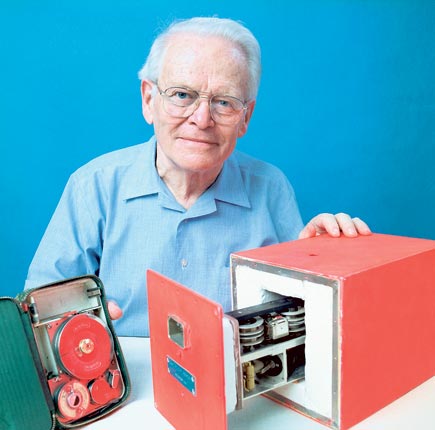David Warren: Inventor and developer of the 'black box' flight data recorder

Whenever we hear of a plane crash, the report inevitably turns at some point to the recovery and analysis of the aircraft's "black boxes", known formally as the Cockpit Voice Recorder (CVR) and Flight Data Recorder (FDR).
David Warren was responsible for inventing the CVR and furthering the development of the FDR, both of which have since helped the investigation of air accidents and, as a consequence, led to safer air travel.
David Ronald de Mey Warren was born in Groote Eylandt, Australia in 1925. His father, an Anglican missionary, was killed in an unsolved plane crash when David Warren was just nine years old. Warren's interest in electronics was kindled by the gift from his father of a simple crystal radio, just prior to the accident. The outbreak of war led to a ban on amateur radio transmissions, so Warren turned his focus towards chemistry, which he went on to study at the University of Sydney.
Following a period as a teacher in Victoria and Sydney, in 1952 he joined the Aeronautical Research Laboratories (ARL) of the Defence Science and Technology Organisation (DSTO) in Melbourne. Here he specialised in the chemistry of aircraft fuels.
The de Havilland Comet passenger aircraft was introduced in 1952 and experienced two unexplained crashes within its first two years, which Warren became involved in investigating. It occurred to him during the inquests that a small recording device installed in the cockpit could have helped determine the causes of the two crashes by allowing investigators to hear the voices of the crew and replay vital flight data. This would effectively provide an enduring witness, after the fact.
His paper "A Device for Assisting Investigation into Aircraft Accidents" (1954) described the theoretical system and by 1956 he had already created a prototype "black box", named the "ARL Flight Memory Unit", which allowed the storage of up to four hours of voice and flight-instrument data. In a 2003 Australian interview he explained:
"I had seen, at a trade fair, a gadget which fascinated me. It was the world's first miniature recorder to put in your pocket. I put the two ideas together. If a businessman had been using one of these in the plane and we could find it in the wreckage and we played it back, we'd say, 'We know what caused this'."
The idea was not at first well received by airlines. Pilots rejected the concept, fearing that these black boxes might be used to spy on crew, and their union, the Pilots' Federation, insisted that "no plane would take off in Australia with Big Brother listening". The Royal Australian Air Force further commented that "such a device is not required" and that " ...the recorder would yield more expletives than explanations".
Fortunately, the 1958 visit to Australia of a British official, Robert Hardingham (later Sir Robert), chief executive of the Air Registration Board, and a former de Havilland employee, was to change the situation. He immediately recognised the importance of the invention and arranged for Warren to visit the UK to demonstrate the prototype.
Within a few years the "black boxes" were commercialised by the British company S. Davall and Son, who named the system the "Red Egg" for its shape and colour, which made it more easily locatable after a crash. By the late Sixties the device was compulsory in all Australian aircraft and soon after was a requirement in civilian passenger-planes worldwide.
Warren's work at the Defence Science and Technology Organisation continued until his retirement in 1983. In 2001 he received the Lawrence Hargrave award for outstanding achievements in Australian aeronautics and in 2002 he was appointed an Officer in the Order of Australia for his service to the aviation industry.
David Ronald de Mey Warren, inventor: born Groote Eylandt, Australia 3 March 1925; married Ruth Meadows (two sons, two daughters); died Melbourne, Australia 19 July 2010.
Subscribe to Independent Premium to bookmark this article
Want to bookmark your favourite articles and stories to read or reference later? Start your Independent Premium subscription today.

Join our commenting forum
Join thought-provoking conversations, follow other Independent readers and see their replies